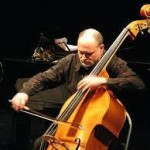Many thanks to David Heyes for his questions published on one of his facebook pages – Bass notes: https://www.facebook.com/BASS-NOTES-1742109579393257/photos/?tab=album&album_id=1748383288765886
1) What first attracted you to the double bass and at what age did you begin lessons?My piano teacher, Yolande Leblan, was double bassist in the Lorraine Philharmonic orchestra and her husband Maurice Leblan, student from Delmas Boussagol, was professor in the city’s conservatoire (Metz, Lorraine, north-east France). She introduced me, and as I liked the violin’s sound very much, but 15 year old, I felt curious and then in love with double bass that I discovered.
2) Which teacher or teachers have had the biggest impact on you?
Maurice Leblan was such a huge player and absolute musician, with a so nice sound and vibrato… ( R.I.P. He died in august 2016 at the age of 96). Gary Karr was at that time the example, rare bass artist who produced so many recordings. Then, Jean-Marc Rollez influenced me so much, revelling my sense of phrasing. François Rabbath then made me free and more open to the world.
3) When did you know that you were a bassist?
When I passed successfully the Opera de Paris orchestra’s audition in 1983, I was 21.
4) Which bassists have inspired you and why?
My meetings with so numerous world talented friends double bassists and ways of playing gave me more pure technique and re-enforced my identity. I am definitely part of the bass singer’s side, but very respectful of any kind of good playing. We do have to stay curious without judging and learn from everybody, about technique, repertoire, musics, instruments… You can see who are my favorite bass friends on facebook, by exploring my timeline.
5) What were your original aspirations? Have you achieved them?
My professional career is successful and fulfilled. Beside, you know I am president of ABCDF, French bass society. During 8 years, I worked a lot for bassists and students, writing 4 reviews per year, organizing each year with the ABCDF team some mini-bass competitions for kids of all ages, and then this wonderful Paris bass convention in 2008 (in CNSMDP), of which I am so proud, which started the idea of a european bass society. I would like to continue in that way.
6) Do you teach? If so, what do you aim to give to your students?
I do and I like it. I try to open students’ minds and encourage them to deeply love double bass and really enjoy playing it with the music they like. I focus them also on their individual physical parameters and adjust in consequence their instruments and regulations. Sometime, it is very important to avoid spoiling a talent due to a not suitable instrument.
7) Which musicians or composers have inspired you and had an impact on your career?
My harmony teacher Jean-Claude Raynaud and my music analysis professor Jacques Casterede ( I did the whole 2 classes in CNSMDP), because they gave me more domination on the music language like composers have. We studied the master composers as Bach, Mozart, Schuman, Debussy Ravel, imitating their styles. I like Haendel, Hindemith and Bartok in particular, all composers in general, and all styles of music as well.
8) Do you perform as a soloist? If so, why? Which repertoire do you enjoy playing?
I do and I like it, humble and unpretentious. I like making nice sounds with my bow and left hand vibrato that I can listen myself, which is the exact contrary of what I do in the orchestra: I almost can’t hear myself, and I have to play a section sound. We spend our whole life as accompanists, ( what I also like), but please let us take a few time to listen ourselves in melodic phrases!
I enjoy playing all expressive solo music with piano, from all periods, but rather modern, original for bass or not. I could maybe say that french music with fine harmonies are my favorite. My recent DVD illustrate it:
Inside, you can find 2 contemporary composers friends of mine, Florentine Mulsant and Richard Dubugnon who wrote a sonata for me, the Debussy cello sonata that I transcribed, and the Tomasi concerto that I revived.
Another reason to play as soloist is for teaching: in a way, it is like research for science: The experience practicing piece gives us more advanced techniques that we can transmit to students. Bass solo playing needs constant researches. All technical methods which are published come from practice.
9) Which is your favourite work for double bass, or a work which you think is important?
Every pieces are important, but, It could be the Henri Tomasi concerto I revived in Mexico, Japan, USA, Taiwan, France after Pierre Hellouin in 1973.
https://www.youtube.com/watch?v=VoqTtDxFa8A
10) Very few of us leave footsteps in the ‘sands of time’. What do you think your legacy will be?
I only would suggest it could be:
“Dear friends musicians and humans, be proud, continue to share and develop creativity with your instrument”.

